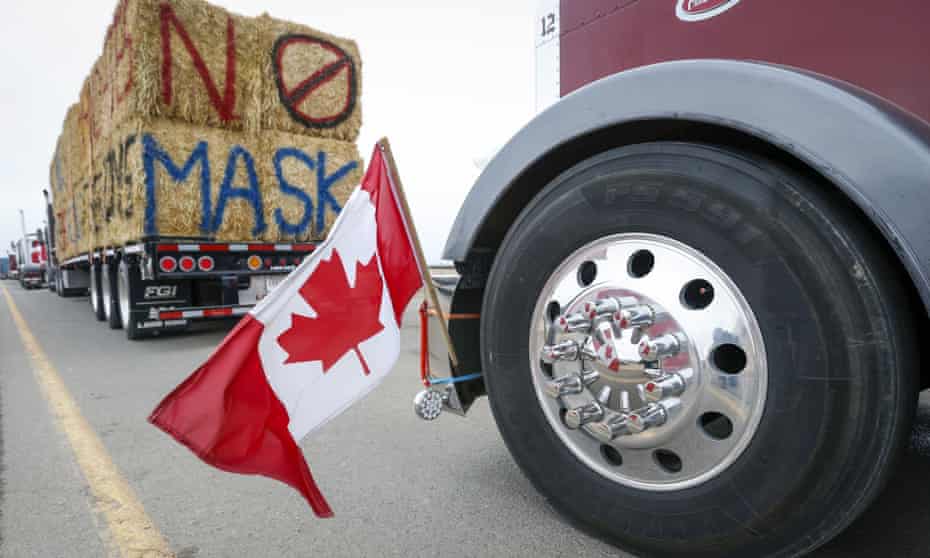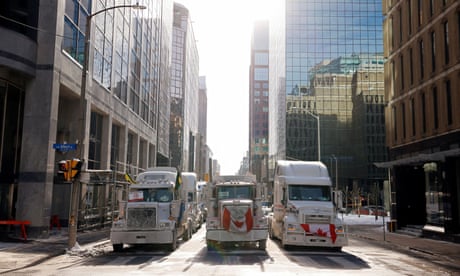Ottawa police considering military intervention to end ‘unlawful’ blockade
Authorities also warned bringing in the military carried a ‘massive risk’ as they believe the protesters are armed
Dozens of tractor trailers are refusing to leave the highway near Coutts, Alberta, where drivers are protesting mask mandates, vaccines, and other Covid-19 restrictions. Photograph: Jeff McIntosh/AP
Leyland Cecco in Toronto
Wed 2 Feb 2022 21.54 GMT
Police in Ottawa warned they may have to call in the military to disband “unlawful” protests in the nation’s capital and a town near the US border, amid mounting tensions between protesters opposing Covid restrictions and local residents.
The Ottawa police chief, Peter Sloly, warned on Wednesday that the officers did not have the resources to remove a fleet of trucks parked by the protesters in the national capital, adding the city was considering requesting help from Canadian armed forces.
But he warned bringing in the military carried a “massive risk”, adding that protesters are believed to have weapons.
“We do not want riots, but all options remain on the table,” he said.
The police chief said that a “significant element” in the United States was involved in organizing and funding the protests.
A GoFundMe campaign to support the demonstration has raised more than C$10m (US$7.9m) in recent days for what began as a protest against a vaccine mandate for truck drivers but has increasingly become an avenue for far-right groups.
Tamara Lich, the crowdfunding organizer, is part of the separatist Maverick party, and Patrick King has previously claimed the coronavirus vaccine is being used to “depopulate the white race”.
Officials expect more protesters to arrive in the city over the weekend, and described the situation “volatile”.
Residents have become increasingly frustrated with the blaring truck horns and a number of local businesses have shuttered. The Rideau Centre, a popular mall downtown, announced it would remain closed until 6 February.
“Residents have been abandoned during a national crisis – an occupation of our city,” said city councillor Catherine McKenney, calling on police to ask the RCMP for help.
Protesters released a statement on Wednesday, saying they sympathized with residents over the disruption to daily life, but added trucks would only leave once the federal government repealed its public health restrictions, many of which are under provincial and municipal jurisdiction.
Many senior conservative lawmakers have embraced the movement, prompting accusations of hypocrisy, after those same parliamentarians called for police to disband Indigenous-led blockades in 2020.
The standoff near the Alberta border town of Coutts has entered its fifth day, with dozens of trucks blocking access to a key highway used to enter the United States. The town is an important border crossing for Alberta’s meat exports and imports of livestock feed.
Police issued an ultimatum to protesters on Tuesday, threatening them with arrest if they remained on the road. A small group left, but many trucks remained. Others breached a police barricade to join the blockade.
The Alberta premier, Jason Kenney, condemned the “unlawful” blockades, calling on protesters to disband and return home. He told reporters people sympathetic with the protests had assaulted police and someone tried to ram RCMP members.

Canada’s Covid protests highlight rise of rightwing populist movements
Read more
“Without hesitation, I condemn those actions and I call for calm amongst anybody who feels sympathetic to those engaged in this blockade,” said Kenney.
After a series of Indigenous-led blockades paralyzed rail traffic in 2020, Kenney’s government passed a law that allows for additional penalties against protesters blockading highways and other infrastructure.
